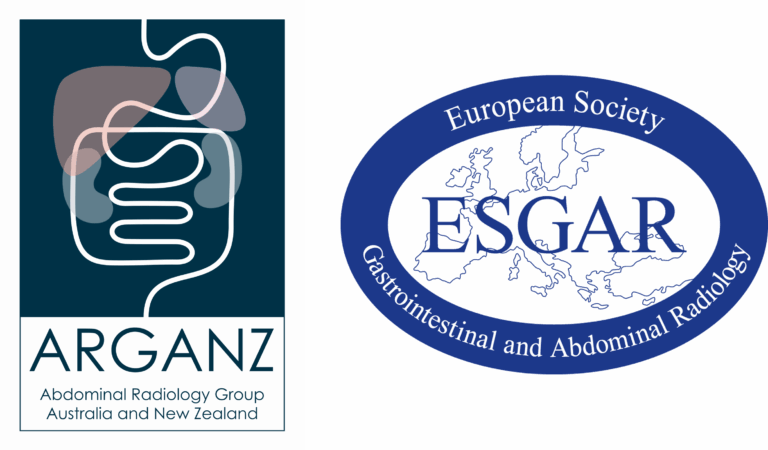An exciting new initiative between ARGANZ and ESGAR is the ESGAR-ARGANZ Fellowships, commencing in 2026.

Designed for radiologists within 5 years of practice following obtaining their FRANZCR Fellowship, this new collaborative exchange between ARGANZ and ESGAR is created to enhance international professional development and foster global collaboration in abdominal radiology. It involves a 3 month observership opportunity at a renowned institution in Europe, with a young ESGAR member also coming to Australia / New Zealand for 3 months.
The fellowship also provides free registration to the relevant ESGAR and ARGANZ meeting during their stay.
A single 2026 ARGANZ Fellow will be selected from applications.
Eligibility: ARGANZ members within 5 years of practice following obtaining their FRANZCR fellowship.
Timing: 3 months duration. Fellowship shall take place during the first half of 2026 to include the dates of the Annual Meeting of ESGAR (Montpellier, France, June 9-12, 2026)
Financial support: AUD$15,000 grant provided by ARGANZ. Complimentary registration to the ESGAR annual meeting provided by ESGAR. The Fellow is responsible for their own flights and accommodation.
Experience: The Fellowship is an unpaid observership for 3 months at the selected institution. Opportunities are likely to include; attendance at multidisciplinary meetings, observation of reporting sessions, review of case libraries, other as may arise.
APPLICATIONS for 2026 NOW OPEN. CLOSING DATE 5th October 2025.
LOCATIONS: The 2026 ARGANZ Fellow can attend one of the following training centres (to be chosen by applicant during application process). It may be possible to arrange a sharing of time between Hospital Saint Joseph and University Beaujon Hospital in Paris. French language is NOT required.
1. Hospital Saint Joseph, Paris, France
The department of radiology at the Paris Saint Joseph Hospital in France (Head: Dr. Marc Zins) performs comprehensive abdominal (GI and GU) imaging and scientific research using state-of-the-art imaging equipment including CT scanners with multispectral technology, 3T MRI. Clinical imaging comprises the whole spectrum of diagnostic and interventional abdominal and digestive imaging including MRI, CT, ultrasonography (using contrast-enhanced techniques). The main areas of expertise in GI include pancreatic and biliary imaging, imaging of the pelvic floor including perianal fistulas in Crohn’s, and imaging of acute abdominal conditions. Strong collaboration between the clinical departments (gastroenterology, proctology, GI surgery and oncology), the department of pathology and the department of radiology allows optimal patient management and fruitful research.
2. University Beaujon Hospital (Université Paris Cité), Paris, France
The department of radiology at the University Beaujon Hospital (Université Paris Cité) in France (Head: Prof. Maxime Ronot) performs comprehensive abdominal and digestive imaging and scientific research using state-of-the-art imaging equipment including CT scanners with multispectral technology, 3T MRI. Clinical imaging comprises the whole spectrum of diagnostic and interventional abdominal and digestive imaging including: MRI, CT, ultrasonography (using contrast-enhanced techniques and shear-wave elastography), endovascular and percutaneous interventional procedures. Strong collaboration between the clinical departments (hepatology, pancreatology, gastroenterology, hepatobiliary surgery, and digestive surgery), the department of pathology and the department of radiology allows optimal patient management and fruitful research.
3. University College London, London/UK
The department of imaging at University College London (Head: Prof. Stuart Taylor, Academic head of department Prof Shonit Punwani, Clinical head of department Dr Doug Pendse) is one of the leading academic imaging departments in the UK. We see a range of both upper and lower gastrointestinal work with many multidisciplinary team meetings throughout the week. The upper GI team run a busy interventional service and we have a leading IBD imaging service including daily bowel US lists and perform large volumes of MR enterography. We also run a busy lower GI cancer service including CT colonography and a state-of-the-art oncological service for colorectal cancer. We have several academic principal investigators whose research is predominantly focused around IBD, assessment of gut motility, academic reporting quality, statistical methodology and abdominal hernias. We have access to high quality imaging platforms including 3T MRI, dual energy CT, PET MRI, and total body PET
Full terms and conditions can be found HERE
Application forms can be found HERE
Experiences can be found HERE
Please note: Grants are subject to change on an annual basis. Terms and conditions are subject to change without notice. Any updates will be published on the ARGANZ website.
